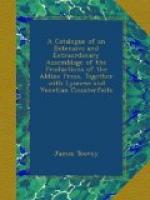Tchin-Sing was not less forward in his accomplishments, and his name stood at the head of his class. Although he was very young he had already gained the right to wear the black cap of the wise men, and all the mothers in the country about wished him for a son-in-law. But Tchin-Sing had but one answer to all proposals; it was too soon, and he desired his liberty for some time to come. He refused the hand of Hon-Giu, of Oma, and other beautiful young girls. Never was a young man more courted and more overwhelmed with sweets and flowers than he, but his heart remained insensible to all attractions. Not on account of its coldness, for he appeared full of longing for an object to adore. His heart seemed fixed upon some memory, some dream, perhaps, for whose realization he was waiting and hoping. It was all in vain to tell him of beautiful tresses, languishing eyes, and soft hands waiting for his acceptance. He listened with a distracted air, as if thinking of other things.
Ju-Kiouan was not less difficult to please. She refused all suitors for her hand. This did not salute her gracefully, that was not dainty in his habits; one had a bad handwriting, another composed poor verses; in short all had some defect. She drew amusing caricatures of everyone, which made her parents laugh, and show the door to the unlucky lover in the most polite manner possible.
At last the parents of both young people became alarmed at the continued refusal of their children to marry, and the mothers commenced to follow the subject in their dreams. One night Madame Kouan dreamed that she saw a pearl of wonderful purity reposing on the breast of her son. On the other hand, Madame Tou dreamed that on her daughter’s forehead sparkled a jasper of inestimable value. Much consultation was held as to the significance of these dreams. Madame Kouan’s was thought to imply that her son would win the highest honors of the Imperial Academy, while Madame Tou’s might signify that her daughter would find some untold treasure in the garden. These interpretations, however, did not satisfy the two mothers, whose whole minds were bent upon the happy marriage of their children. Unfortunately both Tchin-Sing and Ju-Kiouan persisted more obstinately than ever in their refusal to listen to the subject.
As young people are not usually so averse to marriage, the parents suspected some secret attachment, but a few days’ careful watching sufficed to prove that Tchin-Sing was paying court to no young girl, and that no lover was to be seen under the balcony of Ju-Kiouan.
At length both mothers decided to consult the bronze oracle in the temple of Fo. After burning gilt paper and perfume before the oracle, Madame Tou received the unsatisfactory answer that, until the jasper appeared, the pearl would unite with no one, and Madame Kouan was told the jasper would take nothing to his bosom but the pearl. Both women went sadly homeward in deeper perplexity than ever.




